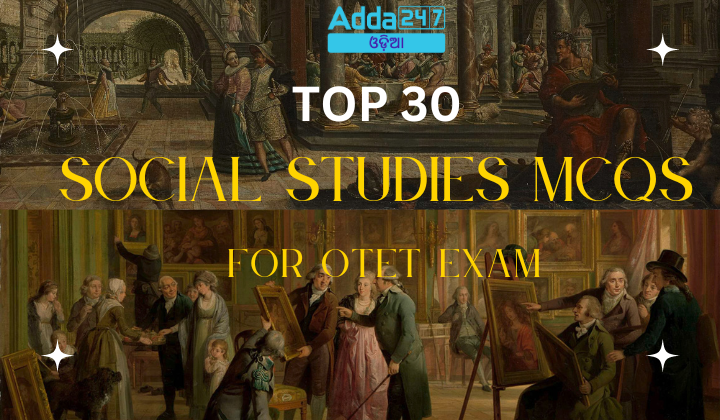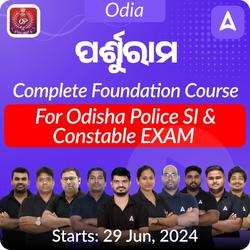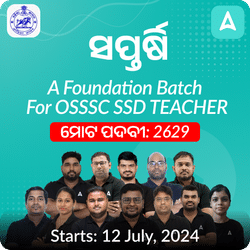Preparing for the OTET exam can be streamlined by focusing on key areas within Social Studies, such as History, Political Science, and Geography. These 30 multiple-choice questions cover crucial topics like the historical periods of the Sultanate, Mughal, and British rule, key figures and events in Indian nationalism, the structure and provisions of the Indian Constitution, and the physical and cultural geography of Odisha. By mastering these questions, candidates can enhance their understanding and increase their chances of success in the OTET exam.
Top 30 Social Studies MCQS For OTET Exam
- What is the primary focus of diagnostic evaluation in education?
(a) Identifying strengths
(b) Identifying weaknesses
(c) Both (a) and (b)
(d) None of the above
Ans: (c) Both (a) and (b) - Which of the following best describes a diagnostic test in education?
(a) Tests that provide a single overall score
(b) Tests that analyze individual performance
(c) Tests that focus on theoretical knowledge
(d) Tests that measure emotional intelligence
Ans: (b) Tests that analyze individual performance
What is the primary goal of remedial instruction in education? - (a) Reinforcing strengths
(b) Ignoring weaknesses
(c) Identifying weaknesses
(d) Addressing weaknesses
Ans: (d) Addressing weaknesses - Why is it essential to follow up diagnostic evaluation with remedial instruction?
(a) To punish students for poor performance
(b) To reinforce strengths
(c) To address identified weaknesses
(d) To ignore student difficulties
Ans: (c) To address identified weaknesses - Which statement best defines the purpose of diagnostic evaluation in reading?
(a) Identifying reasons for lack of interest
(b) Labeling students as weak readers
(c) Determining causes of poor reading ability
(d) Focusing only on reading speed
Ans: (c) Determining causes of poor reading ability - What types of factors might contribute to a student’s difficulty in reading?
(a) Physical condition, sensory defects, emotional tension
(b) High intelligence, strong family support, reading habit
(c) Lack of interest, poor background of experience, left-handedness
(d) Good physical health, emotional stability, high reading speed
Ans: (a) Physical condition, sensory defects, emotional tension - What should be the initial step in a remedial reading program?
(a) Conducting standardized tests
(b) Identifying weak readers
(c) Providing advanced reading materials
(d) Labeling students as remedial
Ans: (b) Identifying weak readers - Why are survey tests in arithmetic sometimes insufficient for diagnosing student difficulties?
(a) They focus on emotional factors
(b) They only test basic skills
(c) They are too challenging
(d) They do not address specific weaknesses
Ans: (d) They do not address specific weaknesses - What is a key characteristic of effective remedial instruction in arithmetic?
(a) Focus solely on drill and practice
(b) Adaptation to student needs and goals
(c) Standardized approach for all students
(d) Ignoring individual weaknesses
Ans: (b) Adaptation to student needs and goals - How should a teacher approach diagnostic tests in education?
(a) Use them to label students
(b) Use them for holistic evaluation
(c) Use them to punish underperforming students
(d) Use them to identify specific weaknesses
Ans: (d) Use them to identify specific weaknesses - Qutb-ud-din Aibak (1206–1210)
(a) Founder of Mamluk Dynasty and Slave of Muhammad Ghori
(b) Eldest son of Qutb-ud-din Aibak
(c) Son-in-law of Qutb-ud-din Aibak
(d) Son of Iltutmish
Ans. (a) - Aram Shah (1210–1211)
(a) Founder of Mamluk Dynasty and Slave of Muhammad Ghori
(b) Eldest son of Qutb-ud-din Aibak
(c) Son-in-law of Qutb-ud-din Aibak
(d) Son of Iltutmish
Ans. (b) - Shams-ud-din Iltutmish (1211–1236)
(a) Son-in-law of Qutb-ud-din Aibak
(b) Eldest son of Qutb-ud-din Aibak
(c) Son of Iltutmish
(d) Son of Ruknuddin Feruz Shah
Ans. (a) - Ruknuddin Feruz Shah (1236)
(a) Son of Iltutmish
(b) Son of Ruknuddin Feruz Shah
(c) Son of Iltutmish
(d) Son of Ruknuddin Feruz Shah
Ans. (a) - Razia Sultana (1236–1240)
(a) Daughter of Iltutmish and Grand Daughter of Qutb-ud-din Aibak
(b) Son of Iltutmish
(c) Son of Ruknuddin Feruz Shah
(d) Son of Iltutmish
Ans. (a) - Muizuddin Bahram (1240–1242)
(a) Son of Iltutmish
(b) Son of Iltutmish
(c) Son of Ruknuddin Feruz Shah
(d) Son of Iltutmish
Ans. (b) - Alauddin Masud (1242–1246)
(a) Son of Iltutmish
(b) Son of Ruknuddin Feruz Shah
(c) Son of Iltutmish
(d) Son of Iltutmish
Ans. (b) - Nasiruddin Mahmud (1246–1266)
(a) Son of Iltutmish
(b) Razia’s Brother who had died in 1229
(c) Son of Iltutmish
(d) Son of Iltutmish
Ans. (b) - Ghiyas-ud-din Balban (1266–1286)
(a) Son of Iltutmish
(b) Son of Iltutmish
(c) Father-in-law of Nasiruddin Mahmud
(d) Grandson of Ghiyasuddin Balban
Ans. (c) - Muiz ud din Kaiqubad (1287–1290)
(a) Son of Iltutmish
(b) Grandson of Ghiyasuddin Balban
(c) Son of Iltutmish
(d) Grandson of Ghiyasuddin Balban
Ans. (b) - Which article defines India as a Union of States?
(a) Article 1
(b) Article 2
(c) Article 3
(d) Article 4
Ans: (a) Article 1 - Who has the power to regulate the right of citizenship by law?
(a) Parliament
(b) President
(c) State Legislatures
(d) Supreme Court
Ans: (a) Parliament - Which article prohibits discrimination based on religion, race, caste, sex or place of birth?
(a) Article 15
(b) Article 16
(c) Article 17
(d) Article 18
Ans: (a) Article 15 - Which part of the Constitution outlines the Directive Principles of State Policy?
(a) Part III
(b) Part IV
(c) Part IVA
(d) Part IX
Ans: (b) Part IV - How many Fundamental Duties are there in the Constitution as of now?
(a) 10
(b) 11
(c) 12
(d) 9
Ans: (b) 11 - Who is the head of the Union Executive according to the Constitution?
(a) Prime Minister
(b) President
(c) Speaker of Lok Sabha
(d) Chief Justice of India
Ans: (b) President - Which article empowers the Governor to promulgate ordinances?
(a) Article 155
(b) Article 161
(c) Article 213
(d) Article 239
Ans: (c) Article 213 - Which amendment introduced Part IX A into the Constitution?
(a) 72nd Amendment
(b) 73rd Amendment
(c) 74th Amendment
(d) 75th Amendment
Ans: (c) 74th Amendment - Which article deals with the administration and control of Scheduled Areas and Scheduled Tribes?
(a) Article 244
(b) Article 244A
(c) Article 245
(d) Article 246
Ans: (b) Article 244A - Under which article does Parliament have exclusive power to legislate on matters related to railways?
(a) Article 245
(b) Article 246
(c) Article 247
(d) Article 248
Ans: (d) Article 248











